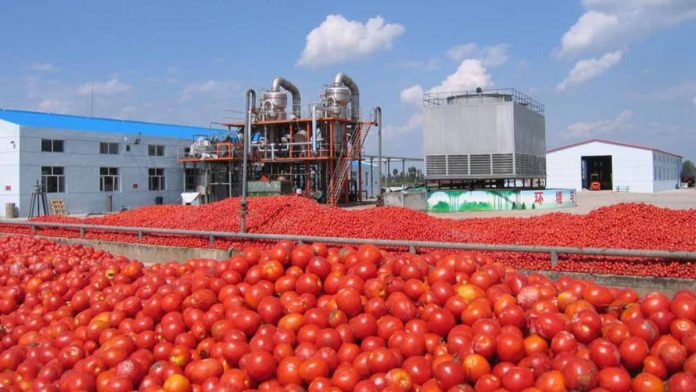
Dangote Tomatoes Processing Plant has established West Africa’s largest technology based green house tomatoes nursery farm worth N3-billion.
This will boost capacity and self-sufficiency in tomatoes production in Nigeria.
The Automated green house nursery located in Kano State is designed to process over 350 million tons of hybrid tomatoes seedling for onward distribution to local farmers across 12 States in the country where the product is heavily cultivated.
First in Nigeria
The Managing-Director of the Farm, Mr. Abdulkarim Lawal Kaita during an inspection tour said the High Tech farm which is the Largest in West Africa and the first in Nigeria is expected to increase harvest from the current 10 tons per acre to as much as 40 tons per acre.
“The automated planting medium you are looking at is called PAT MOOSE, and has the capacity of producing 350 million seedlings per season that can be used to plant an estimated 12,000 hectares of tomato farm with growing to harvesting period of three months”
“The project is being executed under the CBN Tomato Anchor-Borrowers Programme. The CBN will be paying for the seedling that we are cultivating, and it will be distributed to farmers,”
“The farm, in the next three weeks, is expected to deliver high quality tomato seedlings to tomato farmers across the 12 states of the Federation where commodity is heavily cultivated,” he said.
End to Post Harvest Loses
Kaita said that the introduction of the technology would put an end to post-harvest loses, as well as increase the volume of harvest of the commodity..

He further explained that the introduction of the technology would lead to expansion of production of the commodity, beyond the over 2.5 million tons current consumption demand and open door for exportation..
“With this in the next two years, if Government effect the ban on the importation of the commodity, just as it has been done in the case of rice, Nigeria will soon become net exporter of the commodity,” said kaita
He explained that Nigeria spends 360 million Dollars annually on Tomato importation from neighboring countries of Cameroun and Benin Republic, thereby killing our local farmers and exporting employment.
He added that if such amount remains in the Nigeria economy, it would definitely make an impact.








